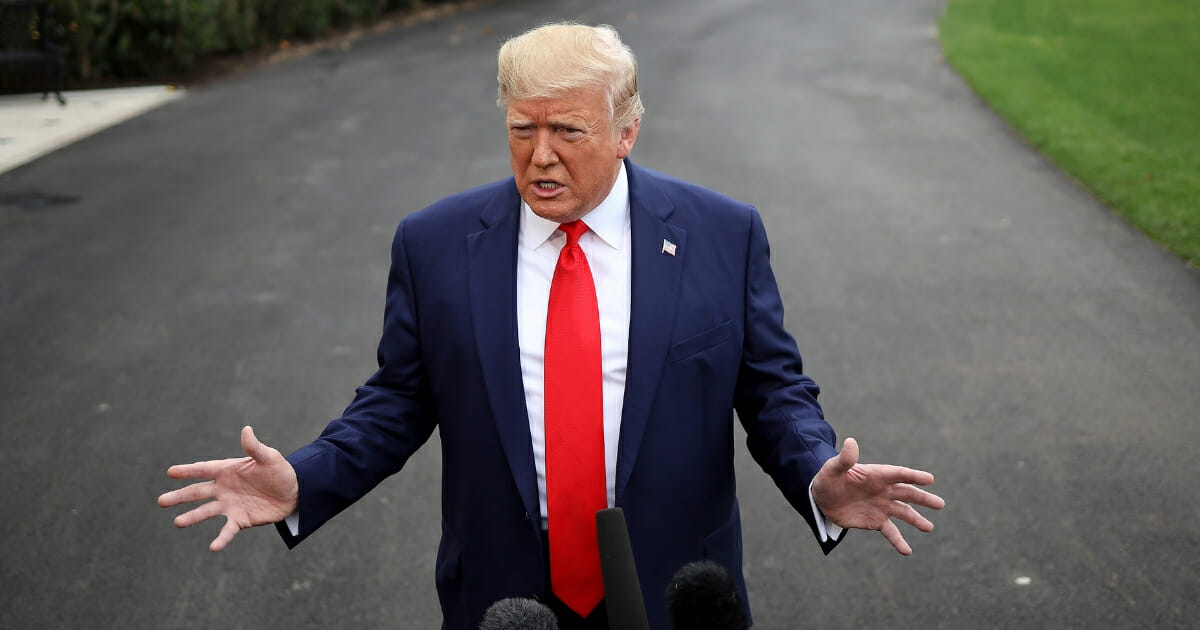
Citing the burden uninsured patients place on America’s hospitals, President Donald Trump on Friday issued a proclamation that will bar individuals from getting visas to enter the United States if they lack the means to have to pay for their own health care or are unlikely to obtain insurance within 30 days of entry.
Trump’s new policy, which does not affect eligibility for asylum or refugee status, is scheduled to take effect Nov. 3, Reuters reported.
In order to gain entry to the U.S., immigrants would need to prove they either have or will have access to private coverage through a job, directly from an insurer or through a family member. Immigrants who would be covered by Medicare can also enter the country.
Trump’s declaration said the action is needed to address the dire straits of many hospitals.
“Healthcare providers and taxpayers bear substantial costs in paying for medical expenses incurred by people who lack health insurance or the ability to pay for their healthcare. Hospitals and other providers often administer care to the uninsured without any hope of receiving reimbursement from them,” the proclamation read, noting that the overall cost of services for which hospitals are not reimbursed has topped $35 billion a year for the past decade.
TRENDING: Rep. Raskin’s Impeachment Media Conference Was So Bad Even CNN Analyst Called It a ‘Hot Mess’
In addition to costs that average $7 million per hospital, “the uninsured strain Federal and State government budgets through their reliance on publicly funded programs, which ultimately are financed by taxpayers,” the proclamation read.
Trump’s proclamation also pointed out that uninsured individuals “often use emergency rooms to seek remedies for a variety of non-emergency conditions, causing overcrowding and delays for those who truly need emergency services.”
The proclamation then connected the flow of migrants into the country to the dilemma facing health care providers.
“[T]he United States Government is making the problem worse by admitting thousands of aliens who have not demonstrated any ability to pay for their healthcare costs. Notably, data show that lawful immigrants are about three times more likely than United States citizens to lack health insurance,” the proclamation said.
Will this rule reduce the cost of taking in immigrants?
100% (1 Votes)
0% (0 Votes)
“Immigrants who enter this country should not further saddle our healthcare system, and subsequently American taxpayers, with higher costs,” Trump’s proclamation added.
The White House document said America welcomes those who can contribute to the country and not be a drain upon it.
“The United States has a long history of welcoming immigrants who come lawfully in search of brighter futures,” the proclamation said.
“We must continue that tradition while also addressing the challenges facing our healthcare system, including protecting both it and the American taxpayer from the burdens of uncompensated care. Continuing to allow entry into the United States of certain immigrants who lack health insurance or the demonstrated ability to pay for their healthcare would be detrimental to these interests.”
In releasing the new policy, the White House also distributed a fact sheet noting that in 1996, former President Bill Clinton and Congress enacted a law saying immigrants should “not depend on public resources to meet their needs.”
RELATED: Trump Tears into Mitt Romney: ‘Pompous A**’ Who ‘Never Knew How To Win’
The fact sheet further pointed out that immigrants “who receive public benefits above a certain threshold are known as a ‘public charge,’ which has been a ground of inadmissibility for more than 100 years.”
The Trump administration has also implemented its own “public charge” rule effective Oct. 15, Fox News reported
The rule will allow officials to deny green cards to anyone deemed likely to rely on government aid.
“The principle driving it is an old American value, and that’s self-sufficiency,” U.S. Citizenship and Immigration Services Acting Director Ken Cuccinelli told Fox. “It’s a core principle — the American Dream itself — and it’s one of the things that distinguishes us, and it’s central to the legal history in the U.S. back into the 1800s.”
“It will also have the long-term benefit of protecting taxpayers by ensuring people who are immigrating to this country don’t become public burdens, that they can stand on their own two feet, as immigrants in years past have done,” he said.
“It’s not only a recipe for their success, but for America’s success growing out of our immigration system.”
We are committed to truth and accuracy in all of our journalism. Read our editorial standards.
via The Western Journal
Enjoy this article? Read the full version at the authors website: https://www.westernjournal.com
